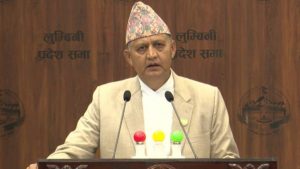
Nepal’s Economic Outlook: ADO Predicts Strong 4.3% Growth in FY2024

In its latest release, the Asian Development Outlook (ADO) for September 2023, the Asian Development Bank (ADB) has projected that Nepal’s economy is poised for robust growth, with a forecasted expansion of 4.3% at market prices in the fiscal year (FY) 2024. This marks a substantial improvement from the estimated growth rate of 1.9% in FY2023.
To bolster this positive economic trajectory, the Nepal Rastra Bank (NRB) has taken action by adjusting its monetary policy stance. The Central Bank (NRB) has lowered the policy rate by 50 basis points to 6.5%. This move is anticipated to result in reduced commercial interest rates, stimulating economic activities. The services sector, including real estate, wholesale and retail trade, as well as accommodation and food services, is expected to thrive. However, the agricultural sector may face challenges due to insufficient rainfall in June and erratic weather patterns, exacerbated by a lumpy skin outbreak in cattle.
The ADO report also anticipates a decline in the annual average inflation rate, from 7.7% in FY2023 to 6.2% in FY2024. This reduction is attributed to subdued oil price increases and a decrease in inflation rates in India, Nepal’s primary source of imports.
Jan Hansen, ADB Principal Economist for Nepal, pointed out, “Fiscal challenges persist despite some progress in restoring price and external sector stability. While the estimated fiscal deficit for FY2024 is moderate at 2.4% of GDP, significantly lower than the 6.1% deficit in FY2023, the actual deficit could exceed expectations if the government fails to meet its ambitious revenue target for FY2024.”
External risks remain relatively manageable, with foreign exchange reserves expected to cover at least 7 months of imports. The current account deficit is projected to widen to 1.8% of GDP in FY2024, driven by stable remittances and increased imports as economic growth accelerates.
However, there are potential downside risks to the FY2024 economic outlook. These risks may materialize if authorities implement more contractionary economic policies in response to geopolitical tensions to curb inflation. Such measures could potentially dampen consumption, disrupt domestic production, and negatively impact overall economic growth.
- Government Committed to Boosting Economy Through Private Sector Cooperation: Minister Bhandari
- National Information Commission Submits Annual Report to PM Oli
- Varun Beverages Nepal Recognized for Highest Contribution to Social Security Fund
- Health Minister Stresses Efficient Resource Utilization at National Review Meeting












Comments